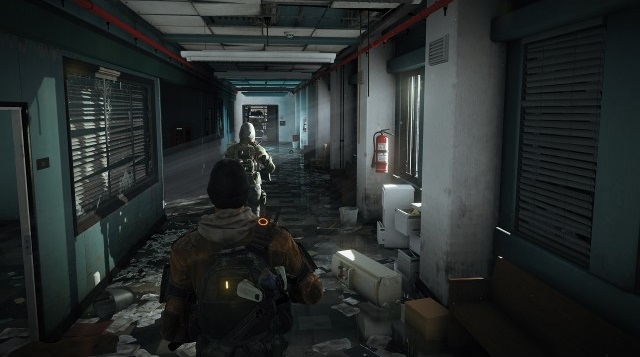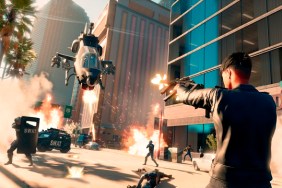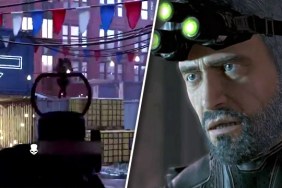Evil money is evil.
Some would say that there's something myopic, or at very least recklessly sensational about the future-foe scenarios Ubisoft hinges their modern-day fiction upon. Here's a breakdown of the dramatic, several minute-long setup for Massive Entertainment's new console MMO, The Division:
Our culture is overly complex, and hence, fragile… because money. Considering the statistics on how much Americans spend in one day of shopping, we get a lesson on influenza, which can apparently survive on bank notes for up to 17 days. Despite the fact that practically no one uses cash during the holidays, Black Friday is ominously pinpointed as the day that the possible end begins, due to the rapid exchange of contaminated dollar bills. By the time patient zero feels the first sore throat, it's already too late and five days later, the United States is on the verge of collapse.
But whether this far-flung premise is timely, or just plain tiresome, starts to become irrelevant as you watch The Division transform from what seems like just another cover-based military shooter into an honest-to-goodness MMORPG(TPS). “RPG-style progression” has been steadily becoming a marketing bullet-point for all things multiplayer over the last few years, but in the case of The Division, it isn't just lip service.
Sure, on its impossibly polished surface, it looks like any other tactical Tom Clancy affair — one of so many assault rifles and street sweepers. And it plays its portrayal of a New York City in mid-crisis arrow-straight, with all the colors and non-colors you'd expect, making it that much more visually interesting when your character suddenly projects a holographic map of the surrounding city blocks onto the asphalt around him. This is a true open world, replete with random events you're free to ignore and other player characters going about their merry business with or without you.
Each player represents a member of The Division, a secret task force of sleeper agents trained explicitly for this scenario. Your charge? To bring New York back from the brink by helping survivors of the viral outbreak and restoring the city's infrastructure block by ruined block. In the E3 demo, you see that there's a nearby police station that's under siege, and after forming a small party of three, you head down the block to lend a hand.
The RPG elements start to kick in when one player opens up another holographic display, this time a generously-sized skill menu. The Division employs a classless system where you can mix and match abilities and weaponry freely, giving you the flexibility to adapt your play style to the situation at hand. Infrared scans reveal heat signatures through walls for everyone in your group; seeker mines tumble along the ground, snuffing out foes behind cover; and still plenty more abilities such as “Pulse” and “Shock Grenade” could be spied on the skill screen, though we never got to see them in action. Cooldown timers and floating damage numbers popping up over enemy's heads completed the picture: The Division is no less an RPG than Borderlands is.
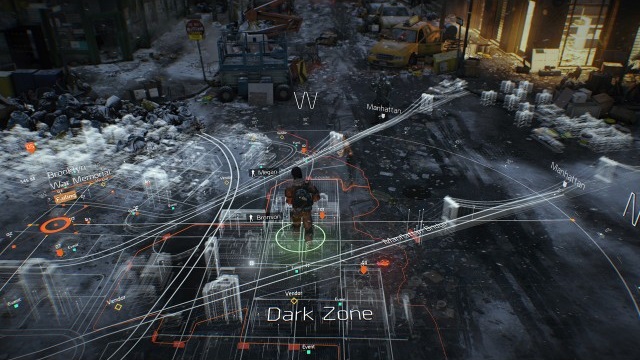
Of course, no RPG is complete without the promise of good loot, and The Division appears to have that base covered too. After fighting through the dilapidated police station and freeing a few officers who had been locked up in the very cells they used to keep watch over, our heroes gain access to an armory where one of them found a shiny new assault rifle. Tangible rewards aside, getting places like police stations back up and running has affects on the world at large, though what those effects are exactly remain unclear.
Having done their good deed for the day, the three agents step outside and fire a smoke flare skyward, signaling a request for extraction. But doing so triggers an event that any PCs in the area will be notified of. The folks all around you might be friendly, but if they aren't, you'll need to dig in and defend the LZ until your ride gets there; otherwise, your spoils will be lost to whomever bags and tags you. While I didn't get to see the event play out, I can imagine this being an intense, potentially chaotic way to punctuate a well-coordinated sortie.
It should be clear by now that The Division breaks a lot of rules. It establishes a believable, grounded aesthetic only to shatter it with gadgets and abilities straight out of a sci-fi action flick. It appeals to one crowd with its tactical, military-based shooting, only to court an entirely different audience with substantial RPG elements. It even has "the nerve" to be an MMO with cutting-edge visuals.
Running on a proprietary engine called Snowdrop, The Division may be the overall best representative of what the first wave of next-gen games will look like, and so far, the future looks extremely detailed and well lit. Colored lights illuminate the different surfaces around them realistically, and car windows and tires buckle so realistically under gunfire that it's hard to believe you aren't watching a cutscene at times.
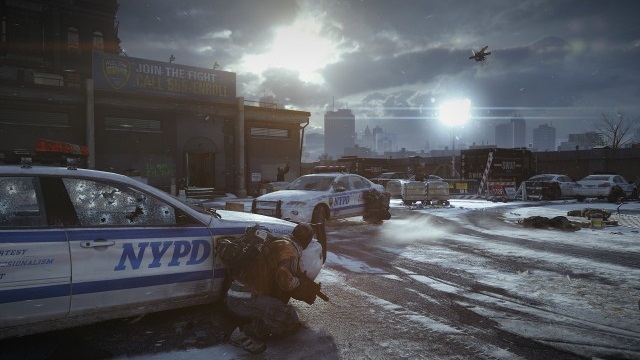
And yet, for all the trends it bucks, the biggest is the last one you'd expect. One of the most prevalent emerging trends out of E3 this year was the integration of mobile and portable gaming devices with console experiences. But while plenty of titles talked the talk, The Division was the only one to walk the walk. The key to its success was in the way it separated the tablet and controller experiences rather than ask players to engage with both at once. Using a tablet (an Android-based unit in this demo), a player may command a flying, robotic drone. From here, they can see every movement of their allies and enemies in real-time. The parity was entirely seamless.
Aside from spotting and marking targets for allies, the drone is capable of debuffing enemy armor, pumping up allied damage output, and healing light wounds. Making effective use of these abilities fills a meter, and once charged, you can initiate more offensive skills, like a predator missile strike. Watching the tablet player laser-designate a target on his screen, only to see a missile come crashing down on enemy soldiers in the main game is a powerful proof of concept.
Slightly ridiculous premise aside, The Division is an ambitious and highly polished-looking title that does a lot of new things, even while looking and feeling familiar enough to just jump into. Don't let its bog-standard name or initial look fool you — there's a unique experience here. And come its 2014 release on Xbox One and PS4, I think I'll be losing more than a few hours to it.
